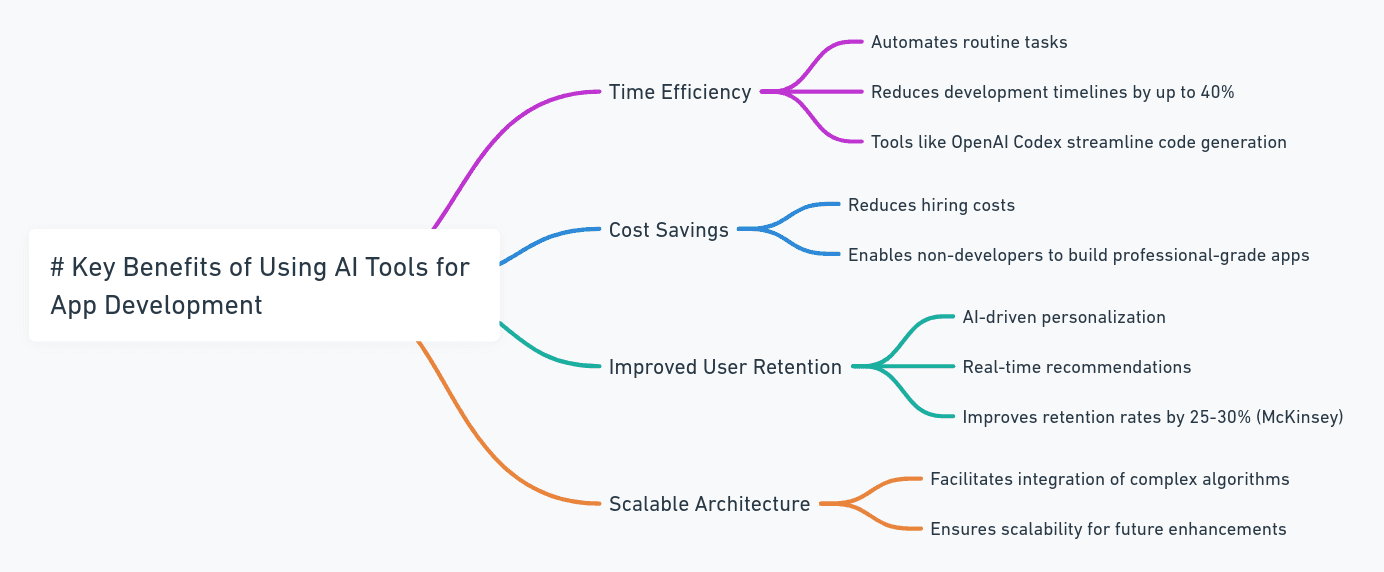Can Mobile Apps Be Built with AI Tools in 2025?
Nov 2, 2024
The rapidly evolving field of Artificial Intelligence (AI) is fundamentally reshaping how mobile applications are built. AI tools are now enabling developers to build sophisticated apps faster, with less effort, and at a lower cost. By 2025, the integration of AI in app development is expected to reach new heights, empowering businesses and individuals to create feature-rich mobile apps.
This comprehensive guide examines the process of building mobile apps using AI tools, enriched with detailed insights, real-world examples, and forward-looking perspectives. Whether you’re a curious learner or an aspiring developer, this resource has you covered.
Table of Contents
Introduction
Key Benefits of Using AI Tools
Types of AI Tools
Steps to Build Mobile Apps with AI Tools
Challenges of Using AI
Popular AI Tools
Case Studies
The Future
Conclusion
FAQs
Introduction
Artificial Intelligence has transcended the experimental stage, becoming a vital asset for app development. AI tools assist developers in designing, coding, testing, and optimizing apps with remarkable speed and accuracy. By 2025, low-code platforms powered by AI are expected to dominate, accounting for nearly 75% of app development activities, according to Gartner.
Key Features of AI Tools
Automated Coding and Debugging: AI tools such as GitHub Copilot accelerate the coding process by generating contextually relevant code snippets.
Enhanced Creativity: Design tools like Figma AI Plugins provide dynamic templates and layouts, freeing up developers to focus on innovation.
User-Centric Features: AI simplifies the integration of functionalities like chatbots, recommendation engines, and image recognition into apps.
Key Benefits of Using AI Tools

The integration of AI tools into mobile app development offers transformative benefits that extend beyond efficiency to creativity and scalability.
Time Efficiency: AI automates routine tasks, reducing development timelines by up to 40%. Tools like OpenAI Codex streamline code generation, allowing developers to focus on critical functionalities.
Cost Savings: Startups and small businesses save on hiring costs by leveraging AI tools, enabling even non-developers to build professional-grade apps.
Improved User Retention: Personalization powered by AI, such as real-time recommendations, improves user retention rates by 25-30%, according to McKinsey.
Scalable Architecture: AI facilitates seamless integration of complex algorithms, ensuring scalability for future enhancements.
Types of AI Tools
AI tools for app development cater to diverse needs, from ideation to deployment. Here’s a detailed breakdown:
Low-Code/No-Code Platforms: Platforms like Bubble and Adalo make app development accessible to non-technical users by integrating AI automation for workflows.
AI Design Tools: Tools like Canva AI and Sketch AI provide intuitive design assistance, generating layouts and responsive templates.
AI-Powered IDEs: Intelligent Development Environments, such as GitHub Copilot, enhance productivity by suggesting and optimizing code.
Testing and Debugging Tools: AI-powered tools like Testim.io automate testing procedures, identifying bugs and ensuring code reliability.
Machine Learning Integration Tools: TensorFlow Lite and Firebase ML Kit allow seamless incorporation of AI features like predictive analytics and image processing.
Steps to Build Mobile Apps with AI Tools
Building a mobile app with AI tools involves a strategic and iterative process. Below are the key steps to guide you:
Define the App’s Purpose: Start with a clear vision for your app, identifying the problem it will solve and its target audience.
Select the Right AI Tools: Research platforms that align with your app’s complexity. For instance, use FlutterFlow for rapid development and TensorFlow Lite for AI-driven functionalities.
Design Prototypes: Utilize AI design tools to visualize your app’s interface and user journey. Figma’s AI plugins can accelerate this phase.
Develop the Core Features: Leverage AI-powered IDEs like Replit AI to code efficiently.
Test Extensively: Use AI testing tools to simulate diverse user scenarios, ensuring robust performance.
Launch and Monitor: Deploy your app and integrate AI analytics tools to gather user insights and refine app functionalities.
Challenges of Using AI Tools
Despite their advantages, AI tools come with challenges that developers must navigate.
Lack of Flexibility: AI tools often operate within predefined frameworks, limiting customization for highly complex applications.
Skill Gap: Developers may need to upskill to fully utilize AI tools, especially those involving advanced machine learning models.
Privacy and Compliance Risks: Incorporating AI features like personalized recommendations requires stringent adherence to data privacy laws like GDPR.
High Initial Costs: While cost-effective in the long run, premium AI tools may require significant upfront investment.
Popular AI Tools

GitHub Copilot: Streamlines code writing with intelligent suggestions.
TensorFlow Lite: Enables the integration of machine learning models into mobile apps.
Dialogflow: Simplifies the creation of AI-powered conversational agents.
Applitools: Automates visual UI testing with AI-based algorithms.
AppGyver: Offers a no-code platform enriched with AI automation for workflows.
Case Studies
Case Study 1: Starbucks Mobile App
The Starbucks app uses AI to deliver personalized drink and food recommendations to its users. This feature was built using AI-driven real-time data analysis, enhancing customer engagement. AI tools also power predictive ordering, where the app anticipates user preferences based on previous orders.
Case Study 2: MyFitnessPal
MyFitnessPal uses AI to analyze users’ dietary patterns and provide personalized fitness and nutrition plans. TensorFlow Lite facilitates the app’s machine learning capabilities, including calorie counting through photo recognition.
Case Study 3: Duolingo
Duolingo employs AI to personalize learning paths for users. The app adapts dynamically to individual learning speeds and challenges, using AI-driven natural language processing models to improve language retention rates.
Case Study 4: Spotify
Spotify integrates AI tools to curate personalized playlists and recommendations. By leveraging predictive analytics, the app enhances user experience, increasing retention and listening time.
The Future of AI in Mobile App Development
By 2025, AI tools are expected to become even more powerful and accessible. Generative AI will likely dominate, enabling developers to create fully functional apps using natural language prompts. Technologies like GPT-5 and advancements in edge AI are predicted to streamline the development process further while enhancing app performance.
Hyper-Personalization: AI will push the boundaries of user experience, delivering unprecedented levels of personalization.
Voice-Powered Interfaces: AI tools will simplify the integration of voice recognition and speech synthesis.
Low-Code AI Models: These will reduce barriers to entry for small businesses and non-technical creators.
Conclusion
AI tools are revolutionizing how mobile apps are conceptualized, designed, and deployed. They empower developers to focus on creativity and innovation while automating repetitive tasks. By 2025, the proliferation of AI-driven app development platforms will further democratize technology, enabling businesses of all sizes to innovate.
Frequently Asked Questions
1. Can AI tools create mobile apps without coding knowledge?
Yes, platforms like AppGyver and Adalo enable non-technical users to build apps without coding.
2. What is the best AI tool for beginners in app development?
FlutterFlow is beginner-friendly, offering drag-and-drop features with AI enhancements.
3. Can AI tools integrate machine learning into apps?
Absolutely, tools like TensorFlow Lite and Firebase ML Kit are specifically designed for this purpose.
4. What are the cost implications of using AI tools?
Many AI tools offer free tiers, but advanced features may require paid subscriptions ranging from $10 to $300 per month.
5. Are AI tools secure for app development?
Yes, but developers should ensure compliance with data privacy regulations like GDPR.
6. Do AI tools support cross-platform development?
Yes, most modern AI tools are designed to support iOS, Android, and web platforms.
7. Can AI tools handle app updates?
Many AI platforms, like Firebase, support continuous updates and real-time analytics for iterative improvements.
8. How reliable are AI-powered testing tools?
AI testing tools like Applitools provide high accuracy and identify bugs that manual testing might miss.
9. What industries benefit the most from AI-powered apps?
Industries like healthcare, retail, education, and finance have seen significant benefits from AI-powered apps.
10. Will AI tools replace traditional developers?
No, AI tools enhance developers’ productivity by automating repetitive tasks, allowing them to focus on complex problem-solving.
